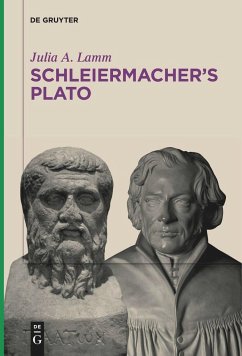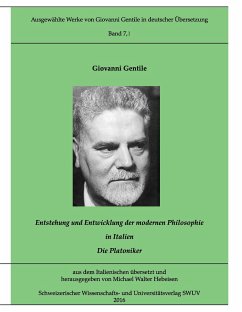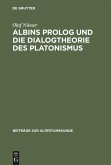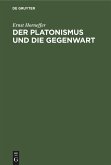Friedrich Schleiermacher's Platons Werke (1804-28) changed how we understand Plato. His translation of Plato's dialogues remained the authoritative one in the German-speaking world for two hundred years, but it was his interpretation of Plato and the Platonic corpus, set forth in his Introductions to the dialogues, that proved so revolutionary for classicists and philosophers worldwide. Schleiermacher created a Platonic question for the modern world. Yet, in Schleiermacher studies, surprisingly little is known about Schleiermacher's deep engagement with Plato.
Schleiermacher's Plato is the first book-length study of the topic. It addresses two basic questions: How did Schleiermacher understand Plato? In what ways was Schleiermacher's own thought influenced by Plato? Lamm argues that Schleiermacher's thought was profoundly influenced by Plato, or rather by his rather distinctive understanding of Plato. This is true not only of Schleiermacher's philosophy (Hermeneutics, Dialectics) but also of his thinking about religion and Christian faith during the first decade of the nineteenth century (Christmas Dialogue, Speeches on Religion). Schleiermacher's Plato should be of interest to classicists, philosophers, theologians, and scholars of religion.
Schleiermacher's Plato is the first book-length study of the topic. It addresses two basic questions: How did Schleiermacher understand Plato? In what ways was Schleiermacher's own thought influenced by Plato? Lamm argues that Schleiermacher's thought was profoundly influenced by Plato, or rather by his rather distinctive understanding of Plato. This is true not only of Schleiermacher's philosophy (Hermeneutics, Dialectics) but also of his thinking about religion and Christian faith during the first decade of the nineteenth century (Christmas Dialogue, Speeches on Religion). Schleiermacher's Plato should be of interest to classicists, philosophers, theologians, and scholars of religion.
"Julia Lamm has provided us with an outstanding example of historical and philosophical scholarship. Schleiermacher's Plato shows how classical scholarship, philosophy and its history, and religious thought were all reconfigured at the beginning of the nineteenth century, and how these transformations were interrelated. There are not many who have been brave enough to wade through this complicated terrain in which so many intellectual currents, traditions, and interactions come together. Lamm is to be thanked and congratulated for her pioneering activity."
Johannes Zachhuber, Journal of Theological Studies, 73 (2022) 420-423
Johannes Zachhuber, Journal of Theological Studies, 73 (2022) 420-423








